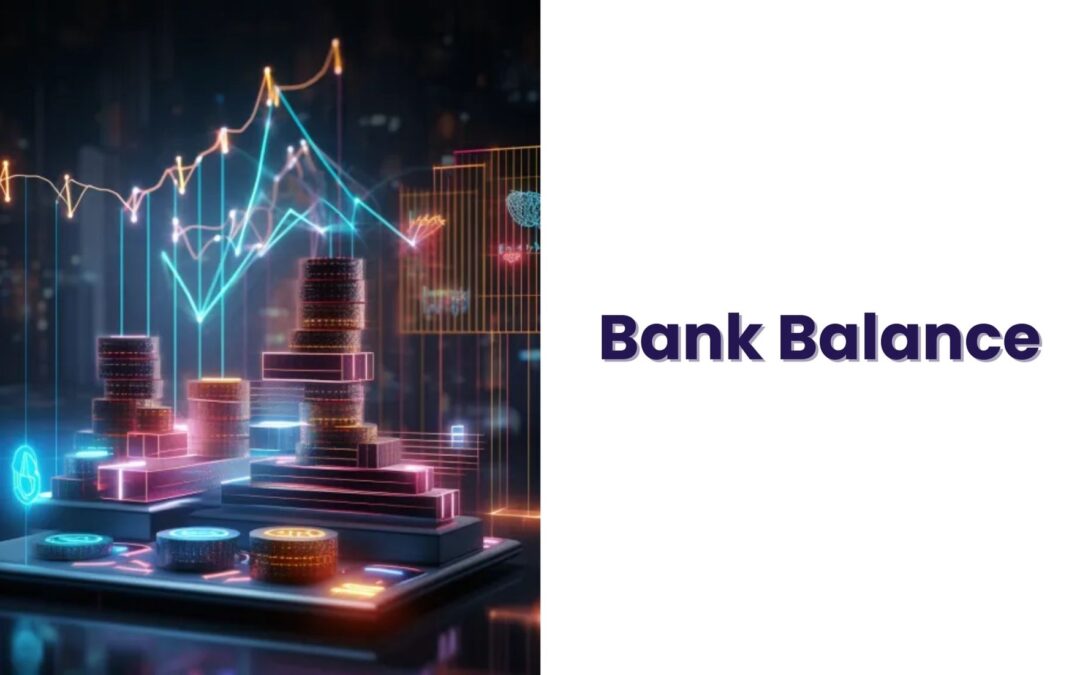
by Toulika | Nov 25, 2023 | Culture & Money, Savings
Welcome to a journey of financial empowerment and wealth-building strategies! In a world where financial stability is both a goal and a challenge, this blog is your compass to navigate the path towards a healthier bank balance. We understand the importance of mastering your finances, and here, we unveil practical insights, actionable tips, and strategic approaches to transform your financial landscape.
Do you want to make your financial health better? Start saving in 24k digital gold. Download the Jar App now.
Embrace Frugality to Boost Your Bank Balance
In a world filled with financial uncertainties, mastering the art of frugality becomes paramount. By adopting smart spending habits, you can pave the way to a more robust bank balance.
Craft a Budget That Works for You
Budgeting Basics: Establishing a well-crafted budget is the cornerstone of financial stability. Allocate your income wisely to essential expenses, savings, and discretionary spending. This simple yet effective strategy ensures you’re in control of your financial destiny.
The Power of Automated Savings
Automate Your Way to Wealth: Harness the power of technology to enhance your savings game. Set up automated transfers to your savings account, ensuring a portion of your income is safely stashed away before the temptation to spend arises.
Slash Unnecessary Expenses To Increase your Bank Balance
Cutting Costs Without Sacrifice: Identify and eliminate non-essential expenses. Evaluate subscriptions, memberships, and impulse purchases that may be draining your finances. Redirect those funds towards your savings, witnessing a significant impact on your bank balance over time.
Strategic Debt Repayment For A Healthy Bank Balance
Tackling Debt Head-On: Addressing outstanding debts strategically is key to financial freedom. Prioritize high-interest debts and create a systematic repayment plan. As you chip away at your debt, you’re simultaneously liberating your bank balance from the burden of interest.
Leverage Cashback and Rewards Programs
Shop Smart, Earn Smart: Transform your everyday expenses into opportunities for savings. Explore cashback and rewards programs associated with your credit cards or favorite retailers. Every purchase becomes a step toward a more substantial bank balance.
Invest in Financial Literacy
Knowledge is Wealth: Equip yourself with financial literacy to make informed decisions about your money. Understand investment options, explore diverse income streams, and cultivate a mindset that views money as a tool for growth rather than a fleeting resource.
Conclusion
In conclusion, your bank balance is a reflection of your financial habits. By implementing these practical tips, you can shift the trajectory of your finances towards prosperity. Embrace frugality, automate savings, cut unnecessary expenses, tackle debt strategically, and leverage rewards – unlocking the path to enduring financial freedom. Remember, every small change today contributes to a wealthier tomorrow.
FAQs on Bank Balance Saving Tips
How does budgeting contribute to a healthier bank balance?
Answer: Budgeting acts as a financial roadmap, guiding individuals on how to allocate their income wisely. By categorizing expenses, including essential needs, savings, and discretionary spending, individuals gain control over their financial resources. This practice ensures that a significant portion of income is directed towards savings, ultimately boosting the overall health of one’s bank balance.
What is the significance of automated savings in financial management?
Answer: Automated savings leverage technology to streamline the saving process. By setting up automatic transfers to a savings account, individuals ensure that a predetermined portion of their income is saved before the temptation to spend arises. This proactive approach to savings fosters consistency and discipline, gradually accumulating funds and fortifying the bank balance.
How can one strategically tackle outstanding debts for financial freedom?
Answer: Strategic debt repayment involves prioritizing debts based on interest rates. By focusing on high-interest debts first, individuals can minimize the impact of accumulating interest. Creating a systematic repayment plan, allocating extra funds to debt reduction, and negotiating interest rates are all integral components of this strategy, contributing to an eventual enhancement of the bank balance.
What role do cashback and rewards programs play in expense optimization?
Answer: Cashback and rewards programs turn everyday expenses into opportunities for savings. By utilizing credit cards or participating in retailer-specific programs, individuals earn cashback or rewards with each purchase. This accumulated value can then be redirected towards savings or used to offset future expenses, offering a tangible boost to the bank balance.
How does financial literacy contribute to long-term financial well-being?
Answer: Financial literacy empowers individuals to make informed decisions about their money. Understanding investment options, exploring diverse income streams, and cultivating a mindset that views money as a tool for growth are essential aspects of financial literacy. By acquiring and applying this knowledge, individuals can make strategic financial choices, fostering long-term financial well-being and ultimately contributing to a healthier bank balance.

by Toulika | Nov 25, 2023 | Culture & Money, Investment, Savings
In a world where financial stability is a key concern for many, mastering strategies to pay off debt and enhance your financial health is a crucial skill. Let’s delve into actionable insights that can pave the way to a debt-free and financially secure future.
Do you want to learn about an amazing app where you can save your money in 24k digital gold?
Download the Jar App today!
Understanding Your Financial Landscape before paying off debt
Before diving into debt payoff strategies, it’s imperative to assess your financial landscape. Conduct a comprehensive review of your income, expenses, and outstanding debts. This step lays the groundwork for a strategic approach to improve your financial health.
Setting Clear Goals: The Roadmap to Financial Freedom
Boldly define your financial goals. Whether it’s paying off credit card debt, student loans, or other financial obligations, having clear objectives provides direction and motivation. Break down your goals into manageable milestones for a more achievable path to financial freedom.
The Power of Budgeting: A Weapon Against Debt
Crafting a realistic budget is akin to having a financial roadmap. Categorize your expenses, differentiating between essentials and discretionary spending. Allocate a significant portion of your income to debt repayment while ensuring you cover necessary living expenses. Tools like budgeting apps can be invaluable in this journey.
Prioritizing High-Interest Debts
Not all debts are created equal. Prioritize paying off high-interest debts first, as they tend to accumulate faster. This approach minimizes the long-term impact of interest rates, accelerating your journey to a debt-free life.
Snowball vs. Avalanche Method: Choosing Your Approach Towards Paying off debt
Two popular debt repayment strategies, the snowball and avalanche methods, offer different approaches. The snowball method involves paying off smaller debts first, gaining momentum, and then tackling larger ones. Conversely, the avalanche method focuses on high-interest debts, saving on interest payments. Choose the method that aligns with your financial priorities and preferences.
Emergency Fund: Your Financial Safety Net
Building an emergency fund is a cornerstone of financial health. In unforeseen circumstances, having a financial cushion prevents you from relying on credit and incurring more debt. Aim for three to six months’ worth of living expenses in your emergency fund for optimal security.
Exploring Additional Income Streams To Pay off debt
Boost your debt payoff efforts by exploring supplementary income streams. Freelancing, part-time gigs, or selling unused items online can inject extra funds into your debt repayment plan. Every additional dollar contributes to your journey toward financial stability.
Celebrate Small Wins: Fuel for the Financial Journey
Acknowledge and celebrate small victories along the way. Paying off a credit card or achieving a savings milestone deserves recognition. Positive reinforcement fosters a mindset of financial discipline and motivates continued progress.
Seeking Professional Guidance
If navigating the intricacies of debt payoff feels overwhelming, consider seeking advice from financial experts. A financial advisor can provide tailored strategies, helping you make informed decisions and optimize your path to financial wellness.
In conclusion, mastering your finances involves a combination of strategic planning, disciplined budgeting, and a commitment to continuous improvement. By implementing these proven strategies, you’ll not only pay off debt but also pave the way for a financially secure and empowered future. Remember, every step forward is a step closer to financial freedom.
FAQs on paying off debt
1. Q: What is the first step in paying off debt and improving financial health?
A: Initiating the process begins with a comprehensive understanding of your financial landscape. Conduct a thorough review of your income sources, monthly expenses, and the extent of outstanding debts. This initial step lays the groundwork for developing a strategic and effective plan to improve your overall financial health.
2. Q: How can I set realistic financial goals for paying off?
A: Setting realistic financial goals involves more than just envisioning a debt-free future. Break down your overarching objectives into manageable milestones. By doing so, you create a roadmap that not only provides clear direction but also serves as a constant source of motivation throughout your journey to financial freedom.
3. Q: Which debt repayment strategy is better – snowball or avalanche method?
A: Both the snowball and avalanche methods are effective, but the choice depends on your personal preferences and financial circumstances. The snowball method focuses on paying off smaller debts first, gaining momentum, while the avalanche method prioritizes high-interest debts, potentially saving you more on interest payments. Select the strategy that aligns best with your financial priorities and motivates you to stay on track.
4. Q: Why is building an emergency fund crucial for financial health?
A: An emergency fund acts as a financial safety net, offering a buffer during unforeseen circumstances. By having three to six months’ worth of living expenses saved, you create a protective shield that prevents the need to rely on credit in times of unexpected expenses. This fund is a cornerstone of financial health, providing peace of mind and stability.
5. Q: How can I celebrate small financial victories along the way?
A: Recognizing and celebrating small financial victories is an essential part of the journey. Whether it’s paying off a credit card or achieving a savings milestone, these achievements deserve acknowledgment. Celebrating these wins reinforces positive financial behavior, fostering a mindset of discipline and motivation to continue making progress towards your larger financial goals.

by Toulika | Nov 24, 2023 | Culture & Money, Investment
In a world where financial solutions are evolving rapidly, the introduction of innovative loan products has become a beacon of hope. Among these groundbreaking offerings are specialized medical loans, finely crafted to address the unique needs of individuals navigating the complex terrain of healthcare expenses.
Do you want to save money in 24k digital gold? Download the Jar App and start saving today!
The Rise of Specialized Medical Loans
As healthcare costs continue to soar, the need for targeted financial assistance in the medical realm has never been more pressing. Enter specialized medical loans, a transformative financial tool designed explicitly for individuals facing the financial challenges associated with medical treatments and procedures.
What Sets Medical Loans Apart?
These loans distinguish themselves by offering tailored features that align with the distinctive nature of healthcare expenses. These loans often come with competitive interest rates, flexible repayment plans, and, most importantly, a streamlined application process that understands the urgency of medical funding.
Your Health, Your Loan
Unlike generic loans, which may not cater to the specific demands of hospital bills, these specialized loans acknowledge the nuanced requirements of healthcare financing. From elective procedures to unexpected health emergencies, these loans provide a financial safety net customized to your health needs.
Navigating the Landscape of Medical Loans
The Benefits Unveiled
Swift Access to Funds
One of the primary advantages of opting for such a loan is the expeditious access to funds. In critical health situations, time is of the essence, and these loans ensure that you can proceed with necessary treatments without delay.
Preserving Your Financial Stability
By opting for a medical loan, you safeguard your financial stability from the potentially devastating impact of unplanned health expenses. Instead of draining savings or resorting to high-interest credit options, these loans offer a strategic and manageable approach to covering healthcare costs.
Swift access to funds, tailored features, and a streamlined application process make these loans a strategic choice for covering healthcare expenses.
Understanding Terms and Conditions
Before diving into the realm of medical loans, it’s crucial to grasp the terms and conditions. Evaluate interest rates, repayment timelines, and any additional fees involved. Being well-informed empowers you to make choices that align seamlessly with your financial goals.
Conclusion: Empowering Your Health Journey
In conclusion, the emergence of specialized medical loans signifies a monumental stride towards holistic financial wellness. These tailored solutions not only alleviate the burden of medical expenses but also empower individuals to prioritize their health without compromising their financial standing.
FAQs about Specialized Medical Loans
Q: What makes medical loans different from traditional loans?
A: These loans are specifically tailored to cover healthcare expenses, offering features like competitive interest rates and flexible repayment plans.
Q: How quickly can I access funds with a medical loan?
A: These loans provide swift access to funds, ensuring you can proceed with necessary treatments without unnecessary delays.
Q: Are there specific criteria for eligibility when applying for a medical loan?
A: Eligibility criteria may vary, but these loans often have a streamlined application process to cater to urgent healthcare needs.
Q: Can I use a medical loan for any type of medical expense?
A: Yes, these loans are designed to cover a wide range of health expenses, from elective procedures to unexpected emergencies.
Q: How do I ensure I’m making an informed decision when choosing a medical loan?
A: Before deciding, carefully review the terms and conditions, including interest rates and repayment timelines, to make a well-informed choice aligned with your financial goals.

by Toulika | Nov 24, 2023 | Culture & Money, Investment
In the dynamic realm of financial transactions, your credit score plays a pivotal role in determining your eligibility for a loan. But, what credit score for loan is generally needed to secure that coveted approval?
Do you want to save money in 24k digital gold? Download the Jar App and start saving today!
Crucial Factors in Credit Score Assessment
1. Credit Score Rundown
Your credit score encapsulates your financial history, showcasing how responsible you’ve been with credit in the past. Generally, lenders scrutinize scores on a scale. What’s the magic number that opens the doors to financial possibilities?
2. The Benchmark: What’s Considered Good?
A credit score of 700 or above is often deemed good, placing you in a favorable position for loan approval. However, different lenders may have varying criteria, so it’s essential to delve deeper.
3. Tailoring Credit Scores to Loan Types
Not all loans are created equal, and neither are the required scores. Mortgages may demand a higher score compared to personal loans. Knowing the specific requirements for your desired loan is key.
Navigating the Loan Application Process
1. Targeted Credit Building Strategies
If your current score falls short, fear not. Strategic steps like timely bill payments, debt reduction, and credit limit management can gradually boost your creditworthiness.
2. Preparing for Loan Success
Before applying, assess your financial health. Ensure your credit report is accurate and up-to-date. Address any discrepancies promptly to present the best possible financial snapshot.
Balancing Act for Optimal Credit Score For Loan Approval Chances
1. Balancing Debt and Income
Lenders scrutinize your debt-to-income ratio. Maintaining a healthy balance ensures you’re not overextended and increases your chances of loan approval.
2. Steer Clear of Red Flags
Consistency is key. Avoid erratic financial behavior, such as opening multiple credit lines in a short span. Stability and reliability in financial dealings contribute positively to your credit profile.
Transitioning to Financial Success
In conclusion, the ideal credit score for a loan application hinges on various factors. It’s not a one-size-fits-all scenario, but rather a nuanced process that demands strategic financial planning.
Frequently Asked Questions (FAQs) About Credit Scores and Loans
1. What is the minimum credit score required for loan approval?
Generally, a score of 700 or above is considered good, but specific requirements may vary among lenders and loan types.
2. Can I improve my credit score to increase my chances of loan approval?
Absolutely. Timely bill payments, debt reduction, and responsible credit management can gradually enhance your creditworthiness.
3. Are there different credit score requirements for various types of loans?
Yes, the ideal score varies depending on the type of loan. Mortgages often require a higher score compared to personal loans.
4. How does my debt-to-income ratio affect loan approval?
Maintaining a healthy balance between debt and income is crucial. Lenders often scrutinize this ratio to assess your financial stability.
5. What steps can I take to prepare for a successful loan application?
Before applying, ensure your credit report is accurate, address any discrepancies, and assess your overall financial health for optimal chances of approval.

by Toulika | Nov 24, 2023 | Culture & Money, Savings
In today’s unpredictable world, financial stability is more crucial than ever. One key component of a robust financial plan is often overlooked but holds immense importance — the Emergency Fund. Let’s delve into the essentials of what an Emergency Fund is and why it’s a non-negotiable aspect of financial well-being.
You can start saving money in 24k digital gold. Download the Jar App now.
Understanding the Emergency Fund
It is your financial safety net, a cushion to soften the blow of unexpected expenses. It’s not a matter of ‘if’ but ‘when’ unforeseen circumstances arise — be it a sudden medical expense, car repairs, or unforeseen job loss. Your Fund is there to catch you when life throws a curveball.
The Core Purpose of an Emergency Fund
The primary purpose of a Fund is to provide immediate financial relief when faced with unexpected situations. It ensures that you can cover essential expenses without resorting to high-interest loans or disrupting your long-term financial goals.
Why Do You Need An Emergency Fund?
1. Financial Resilience
Life is unpredictable, and financial challenges can arise at any moment. An Emergency Fund empowers you to navigate these challenges without compromising your financial stability. It serves as a shield, allowing you to bounce back swiftly and continue pursuing your goals.
2. Peace of Mind
Knowing you have a financial safety net brings unparalleled peace of mind. Whether it’s a sudden health crisis or a necessary home repair, having funds readily available eliminates the stress associated with finding quick solutions. Your Emergency Fund becomes a source of tranquility in times of turmoil.
3. Avoiding Debt Traps
Without an Emergency Fund, individuals often resort to credit cards or loans to cover unforeseen expenses. This can lead to a vicious cycle of debt with high-interest rates, making it challenging to break free. An adequate fund acts as a preventative measure, saving you from falling into these debt traps.
4. Opportunity to Invest
Having an Emergency Fund doesn’t mean stashing money under your mattress. It opens the door to strategic investments and wealth-building opportunities. Knowing your basic needs are covered allows you to explore avenues for growing your wealth without compromising your financial security.
How to Build and Maintain Your Emergency Fund
1. Set a Realistic Goal
Begin by determining how much you need for three to six months of living expenses. This should cover necessities like rent or mortgage, utilities, groceries, and insurance.
2. Consistent Contributions
Building your Fund is a gradual process. Set aside a fixed amount from each paycheck dedicated to this fund. Consistency is key to ensuring it grows steadily over time.
3. Separate Account
Keep your Emergency Fund in a separate account to avoid temptation. This separation also adds a psychological barrier, reinforcing the fund’s purpose as a safety net rather than discretionary spending.
4. Regularly Review and Adjust
Life circumstances change, so should your Emergency Fund goals. Regularly review your fund’s adequacy and make adjustments based on changes in income, family size, or other significant life events.
In conclusion, an Emergency Fund is not a luxury but a necessity in today’s fast-paced and uncertain world. It provides the financial resilience needed to navigate unexpected challenges while offering peace of mind and the opportunity for financial growth. Make building and maintaining your Fund a priority, and you’ll be laying the foundation for a more secure and prosperous financial future.
FAQs
Q1: What is the purpose of an Emergency Fund?
A1: A Fund serves as a financial safety net, providing immediate relief in the face of unexpected expenses, ensuring you can cover essential needs without resorting to high-interest debt.
Q2: How much should I aim to save in my Emergency Fund?
A2: Aim to save three to six months’ worth of living expenses, covering essentials like rent, utilities, groceries, and insurance to ensure comprehensive financial security.
Q3: Can I use my Emergency Fund for non-emergencies?
A3: It’s recommended to reserve your Fund strictly for genuine unforeseen circumstances, avoiding the temptation to dip into it for non-urgent expenses.
Q4: How often should I review and adjust my Emergency Fund?
A4: Regularly review your fund’s adequacy, making adjustments based on changes in income, family size, or significant life events to ensure it remains aligned with your evolving needs.
Q5: Can I invest my Emergency Fund?
A5: While the primary purpose is liquidity, once adequately funded, your Fund can offer the opportunity for strategic investments without compromising your financial security.





